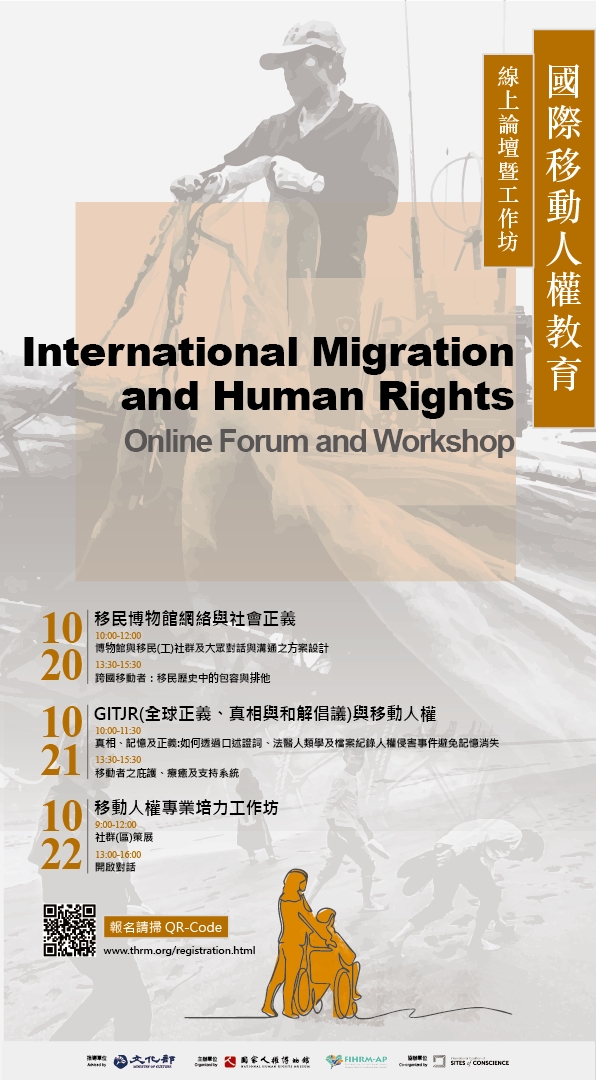International Migration and Human Rights Online Forum and Workshop

國際移動人權教育線上論壇暨工作坊 2021/10/20 - 10/22
Developing a Program for Communication between Museums, Migrant (Workers) Community and the Public
Date and Time: 10:00-12:00 am October 20th, 2021, (GMT+8)
EST: 10 pm-12:00 October 19, 2021
With the wave of transnational migration on the rise across the globe and the multiple impacts brought by transnational migrants to destination societies, how can museums, commonly regarded as institutions forging national and self-identities, work with migrant communities to develop exhibitions and educational programs which is migrant-community-oriented as a way to build a bridge for communication between migrant communities and the public of destination societies? Also, how do museums facilitate recognition, understanding, and acceptance between people of different cultures and identities through the dialogue to challenge stereotypes, discrimination, and xenophobia in the mainstream consciousness and public opinion?
Speakers:
(1) Mikala Woodward, Senior Exhibit Developer and Oral History Manager, Wing Luke Museum of the Asian Pacific American Experience, USA
(2) Rohini Kappadath, General Manager, Immigration Museum, Museums Victoria, Australia
(3) Hsu-Wen Yuan, Research Assistant, National Taiwan Museum, Taiwan
(4) Ying-Hsuan, Li, Section Chief, Kaohsiung Museum of Labor, Taiwan
Moderator: Linda Norris, ICSC
Transnational Migrants: Inclusivity and Exclusivity in Immigration Histories
Date and Time: 13:30-15:30, October 20th (GMT+8)
EST: 1:30 AM-3:30 AM October 19
As the history of immigration is often deployed in the process of national identity and subjectivity building, some communities are included in “our” history while some are excluded. The history of immigration itself is highly politically charged. Some transnational migrant communities or ethnic groups are accepted by officially approved mainstream narratives while some are excluded. How do museums support a safe space for those migrants who are marginalized by history and society and denied discursive power so that they can come forward and even take action to fight against official and mainstream narratives?
Speakers:
(1) Agnès Arquez Roth, Head of the Network & Partnerships Department, National Museum of Immigration History, France
(2) Chia-Ni Wu, Associate Curator & Leader of Public Service Division, National Museum of Taiwan History, Taiwan
(3) Tashi Phunstok, Director, the Tibet Museum, India
(4) Ed Tepporn, Director, Angel Island Immigration Station, United States
Moderator: FIHRM-AP (Chia-Li Chen, Consultant of FIHRM-AP and Professor of Museum Studies at the Taipei National University of the Arts, Taiwan)
Truth, Memories and Justice: How to Preserve Memories by Documenting Human Rights Violations through Oral Testimonies, Forensic Anthropology and Archiving
Date and Time: 10:00-11:30 am (GMT+8) October 21nd, 2021
EST: 10:00 PM-11:30 PM, October 20, 2021
From the moment a transnational migrant departs to the time he/ she reaches the destination country, the enormous difficulties and challenges of the journey are little known to outsiders. They easily fall prey to labor and sexual exploitation and violence while having trouble being accepted as equals by their destination society. How do human rights organization workers present truths and preserve memories through ways like oral testimonies, forensic anthropology, and archiving to realize social justice and bring about reforms?
Speakers:
(1) Perla Torres, Family Network Director, Colibri Center for Human Rights, Arizona, USA
(2) Christine Alai, Legal Consultant, Program on Sexual Violence in Conflict Zones,
East African Centre for Human Rights, South Sudan
(3) Father Peter Nguyen Van Hung, Director,
Vietnamese Migrant Workers and Immigrants Office of the Catholic Church, Hsinchu Diocese, Taiwan
Moderator: Braden Paynter, ICSC
The Shelter, Caring and Support Systems for Migrants
Date and Time: 13:30-15:00, October 21nd (GMT+8), 2021
EST: 1:30 AM-3:00 AM October 20
Transnational migrants are often highly vulnerable to slavery, exploitation, violence, and persecution and sustain physical or mental traumas no matter their migration is the result of forced relocation caused by racial, tribal, or religious conflicts such as asylum seekers or voluntary diaspora like migrant workers. In addition to providing shelter and care, how do human rights organizations support transnational migrants to seek justice and comfort and rebuild their future byways like documenting and archiving human rights violations and support systems like wellness (art therapy) workshops?
Speakers:
(1) Mofidul Hoque, Liberation War Museum, Bangladesh
(2) Kaili LEE, Director, GOH-Migrants, Garden of Hope Foundation, Taiwan
(3) Hsiu-Lien Chen, Researcher, Taiwan International Workers Association, Taiwan
Moderator: FIHRM-AP (Shu-Han, Lin, Refugee Project Specialist, Taiwan Association for Human Rights)
Full-Day Workshops
Date: October 22rd, 2021
Time: 9:00-12:00 - 13:00-16:00
Community Curation: Linda Norris, Facilitator
What does it mean for a museum to create exhibitions in partnership with immigrant and migrant communities? How can authority be shared? In this interactive workshop consider how your museum’s values can shape exhibitions and how to integrate personal stories and objects to enhance larger stories and conversations. We’ll create frameworks for using community advisory committees and ways to that exhibitions can create long-lasting community partnerships.
In Dialogue: Braden Paynter, facilitator
This workshop shares methodology from Sites of Conscience for building dialogic interpretive programs. Dialogic interpretation believes that every person has value to contribute to our understanding and seeks to build the conversation between site staff and visitors to expand our collective understanding, and use site content to inspire visitors to action. Focuses of the workshop will include working with a complicated history and an introduction to the structure and skills for facilitating dialogue. The workshop will involve short lectures, small group work, and active participation.


